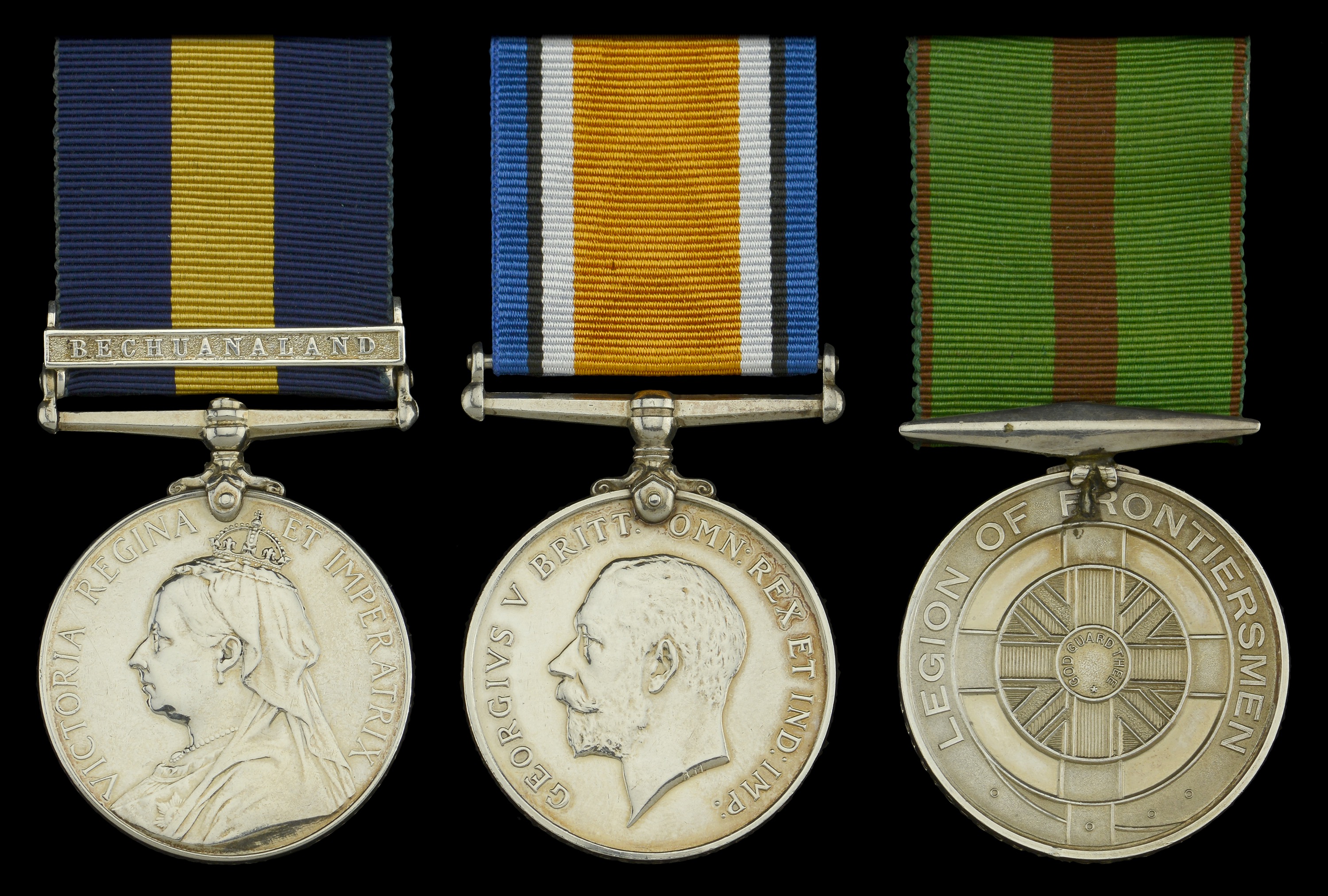Three: Lieutenant H. C. Edwards-Carter, Royal Naval Volunteer Reserve, late Kimberley Rifles and Devonshire Regiment; sometime Deputy Commandant-General of the Legion of Frontiersmen Cape of Good Hope General Service 1880-97, 1 clasp, Bechuanaland (Pte. H. C. Carter, Kimb. Rif.); British War Medal 1914-20 (S. Lt. H. C. Edwards-Carter, R.N.V.R.); Legion of Frontiersmen Meritorious Service Medal (Leg. Col. H. C. Edwards-Carter); together with the recipient’s Silver War Badge, the reverse officially numbered ‘2417’, good very fine (3) £300-£400 --- Provenance: Dix Noonan Webb, September 2019 ( Silver War Badge since added) Henry Cecil Edwards-Carter, né Carter, was born at Deptford, Greenwich in 1875. He appears to have arrived in South Africa circa 1894 and held various clerical positions. During this time he served as a Private in the Kimberley Rifles, 1896-97 and was awarded the Cape of Good Hope General Service Medal with clasp for Bechuanaland; he may also have served with the Duke of Edinburgh’s Own Volunteer Rifles 1899-1901 and received a Queen’s South Africa medal. He adopted his mother’s maiden name ‘Edwards’ prior to being employed by the Transvaal Land Settlement Board in 1908. Resigning his temporary employment with the High Commissioners Office on 31 March 1914 he returned to England. Edwards-Carter’s chequered Great War record commenced with his appointment as Temporary Captain in the Sportsman’s Battalion, Royal Fusiliers on 15 October 1914, before subsequently transferring to the 12th Reserve Battalion, Royal Warwickshire Regiment and then becoming attached to the 1st Garrison Battalion, Devonshire Regiment. His relationship with his fellow officers in the Devonshire Regiment was difficult and he was charged with ‘Behaving in a scandalous manner unbecoming the character of an Officer’ on 7 September 1915; an application for General Court Martial followed. It appears there was dispute over an overseas posting and the anticipation of repayment of expenses resulting in his cheques being dishonoured. The G.O.C. Southern Command recommended on 22 September 1915 ‘I do not think his trial by Court Martial is desirable’. Much against the Commanding Officer’s wishes he was officially transferred to the Garrison Battalion, The Devonshire Regiment on 7 October 1915. Much against Edwards-Carter’s wishes he was then persuaded to relinquishes his commission on account of ill-health on 22 October 1915. He was issued with the Silver War Badge No 2417 which was authorised 2 November 1916. Next appointed to the Munitions Inspection Department as an Examiner-in-Charge in August 1916, Edwards-Carter resigned this appointment in March 1918, and was subsequently appointed temporary Sub-Lieutenant in the Royal Naval Volunteer Reserve on 20 July 1918. Appointed a Transport Officer 4th Grade in H.M.S. President IV he was employed with the Naval Transport Service, Glasgow. He served in France from January 1919 to November 1919 and was promoted Temporary Lieutenant, R.N.V.R., on 23 July 1919. His temporary commission and appointment were terminated due him being medically unfit suffering from asthma on 3 December 1919. Following his discharge he wrote a lengthy letter (a copy of which is included with the lot) dated 26 April 1921 to the Private Secretary to His Majesty the King detailing his understanding of his war record and unsuccessfully lobbying to receive an honour in recognition of his war service. Obtaining employment with the Ministry of Agriculture as a translator in July 1921 he joined the Legion of Frontiersmen in 1923 and was later appointed their Deputy Commandant-General, receiving the Legion’s Meritorious Service Medal. He died at 29 Gilbert Street, Westminster on 26 January 1934, aged 55, with his funeral service taking place in St Clements Danes Church, Strand. Sold with copied service records and a large amount of further research.
Auctioneer's Buyers Premium: 24% (+VAT)
There is an additional charge of 4.95% (+VAT/sales tax)
See Full Terms And Conditions





